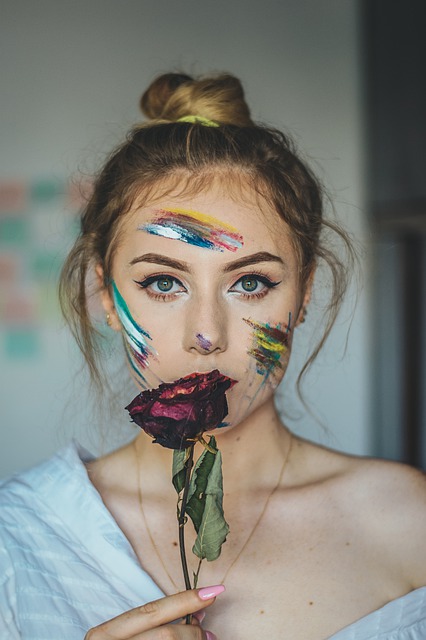
Though we often talk about the unrealistic standards set by the beauty industry, one may not have expected the next step in the beautifying process would be giving up our own blood cells. Known as a “vampire facial,” the doctor will draw your blood, extract the platelet-rich plasma, and apply it topically. Kim Kardashian is just one celebrity who has taken advantage of this process.
The makeup industry has profited by motivating women to create an aesthetic appeal for themselves, while at the same time eliminating the true purpose of skincare and makeup: to ornament and accentuate an individual’s God-given, natural beauty.
From the time of the ancient Egyptians, men and women alike wore eyeliner, eyeshadow, lipstick, and blush. The ancients used makeup as a symbol of beauty, as well to denote their spiritual beliefs and social status. It was a tool, meant to express deeper truths about an individual’s conception of beauty, femininity, and spiritual realities.
Makeup still serves as an outlet for individuals to ornament their natural beauty and unique style. But with pressures from social media and the rapidly-expanding skincare and makeup industries, celebrities and influencers have led many individuals to use makeup to change themselves and project false, disingenuous messages.
Though calling makeup a tool is decidedly unromantic, one can compare it to the way Cicero instructed orators to ornament their speeches. The ability to decorate, embellish, and refine reflects both a human being’s rational nature and the deep understanding they have of the thing being ornamented. If one can communicate something beautifully, then he understands it better than if he could only communicate it simply. If one understands the beauty of the human face, using makeup to accentuate that beauty signifies a greater appreciation and understanding of that beauty.
Ornamenting what is already beautiful is part of human nature. In the same way one decorates a church or embellishes an essay, makeup can be used as a way of beautifying an individual’s appearance.
Makeup should not be used to project an image different from one’s own natural looks. The evolution of the beauty industry has diminished our nature to the point where makeup has mostly become a form of self-fashioning, not a symbol of our rationality.
In 2018, the global skincare market was valued at nearly $135 billion, and the global face makeup market was worth $31.3 billion. The makeup market is projected to reach a value of $36.5 billion by 2024.
With an expanding industry, the use of social media, and celebrity-driven skincare routines and products that range from leech therapy to bee-venom facials, makeup has become another way to impress others. The person who can afford the highest-quality makeup and skincare products, master the techniques of makeup application, and gain the most Instagram followers is the one who has the greatest social and cultural currency. This is most often the celebrity being paid millions to concoct another mixture with their name on it.
Gwyneth Paltrow’s “Goop,” her lifestyle company which sells “GoopGlow Morning Skin Superpowder” and other skincare and health products has been repeatedly accused of advertising these items with no scientific evidence of their efficacy.
While mastering the art of putting on makeup doesn’t mean an individual is necessarily projecting a fake image, some of these celebrity-endorsed products or techniques detract from an individual’s true beauty.
Even celebrities who don’t wear makeup use it as another way to create an impression on people. The desire to be “raw and real,” as Alicia Keys says, is simply another practice which trends on the other extreme end of the spectrum, this time by not wearing any makeup at all.
Putting on makeup for the explicit purpose of enhancing one’s natural beauty doesn’t make an individual any less real. Both overusing makeup or rejecting it as a tool reduces the very human desire to ornament one’s own natural beauty. Though some may naturally be inclined to wear less makeup, the decision to reject makeup in order to be more “real” can often be an unknowing rejection of our nature.
Given the size of the industry and the pressure created by social media demands and celebrities, makeup has ceased to be a rational form of expression. It is no longer ornamentum, but instead a way of self-fashioning in the spirit of living skin-deep. This mode of living reflects the deeper problems with a modern society, whose greatest solutions come packaged in a $60, three-ounce bottle with some French words on it.
Makeup can serve to create a dissonance between our interior and exterior mode of living. By only using makeup to cover up or project something different from the internal state of one’s soul, a person risks denaturing himself.
We should and can use makeup to accentuate our natural looks. Our ability to create new makeup products and take care of our skin and looks is a sign of our ingenuity and rational nature. We must, however, cultivate these abilities wisely and with the purpose of ornamenting our already beautiful features.
Emma Cummins is the assistant opinions editor for The Collegian and is a junior studying politics.

